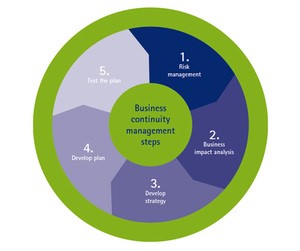In today’s unpredictable world we are seeing more and more high profile disasters and other organisational challenges. It is vital nowadays that you not only have a back up plan for your data and computer systems, but also your people and critical processes. Who needs what? where? and when? are all vital questions that need to be answered incredibly quickly after any incident if you want to minimise the impact on your bottom line.
An increased scrutiny from the global media and social networking platforms also means that it doesn’t matter how well you plan to deal with a business interruption, if you are unable to control the story and ensure a positive message is sent to onlookers, all your hard work may well just be in vein.
It is therefore vital that you have reviewed your business and planned your recovery steps before any disaster hits. This will not only save you time and money in recovery but also ensure that your customers and stakeholders see a timely and effective recovery which should only act to strengthen your reputation and market share in the long run.
Why have a Business Continuity Plan?
Having a Business Continuity Plan has become a legislative requirement in many countries.
If you are a key supplier to an external organisation they will request you to have a BCP in place to do business with you.
A Board of Directors and Senior Management have a responsibility to protect the assets of an organisation, and your Business Continuity Plan is part of what is required to do that.
Research has shown that an organisation stands to lose up to 60% of its productivity within just a few days following a major disaster, often making it uncompetitive in the long run. To make matters worse, experience has shown that insurance usually covers only 30-50% of all losses in a disaster.
A tested BCP gives your insurers confidence that you will recover more quickly from a crisis event, and this often translates to lower premiums.
“It takes fifteen times the amount of money to recover from a disaster than it would have taken to carry on with a properly executed recovery plan.”
The Business Continuity Planning Process
Business Continuity processes implemented by Standby are developed in line with internationally recognised standards such as the ISO 22301, BS1200 and AS/NZS5050:2010. Our work also correlates with accepted best practice activities such as those developed the Disaster Recovery Institute International (DRII) and the Business Continuity Institute (BCI). As BC professionals we are constantly monitoring these set standards and aligning our procedures to them.












